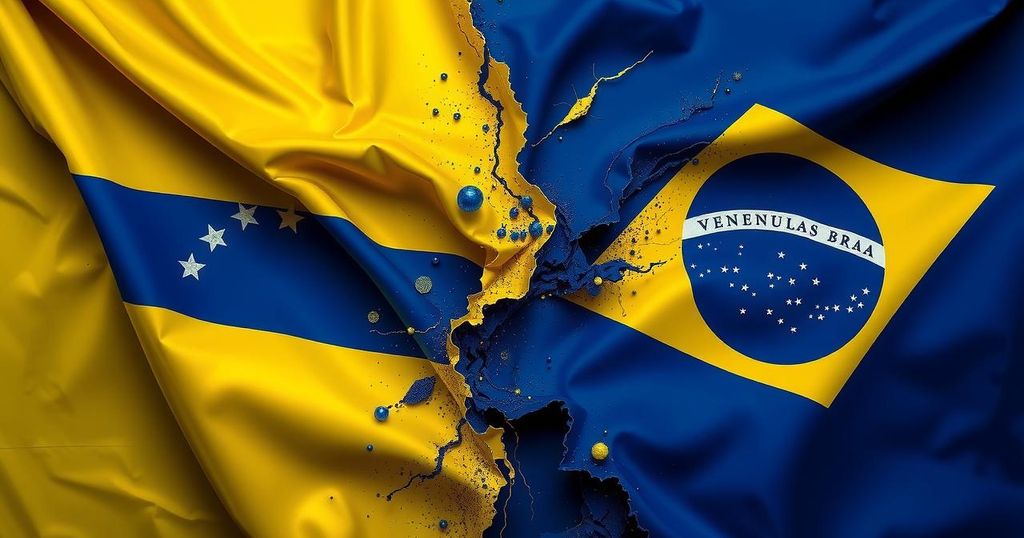Venezuela Recalls Ambassador from Brazil Amid Diplomatic Tensions

The Venezuelan government has recalled its ambassador from Brazil in response to perceived interventionist remarks from Brazilian officials, particularly targeting foreign policy advisor Celso Amorim. This recall followed the tensions surrounding Venezuela’s disputed election results and Brazil’s veto of Venezuela’s BRICS membership, as Venezuelan officials accuse Brazil of meddling in their internal affairs.
On Wednesday, the Venezuelan government announced the recall of its ambassador from Brazil, attributing this decision to what it termed “repeated interventionist and rude statements” from officials in Brasília. Furthermore, Venezuela’s foreign ministry disclosed plans to summon Brazil’s business envoy for discussions. The Venezuelan government specifically criticized Celso Amorim, the top foreign policy advisor to Brazilian President Luiz Inácio Lula da Silva, for what it perceives as his role in promoting North American imperialistic agendas and for issuing unwarranted judgments regarding Venezuela’s internal democratic processes. In a related political development, Jorge Rodriguez, the head of Venezuela’s parliament, has suggested a vote to declare Amorim a persona non grata, alleging that he has been acting as a representative for U.S. National Security Advisor Jake Sullivan. This diplomatic friction escalated following Venezuela’s contentious presidential election held in July, during which President Maduro’s government claimed victory without publishing official ballot results. Meanwhile, Brazilian President Lula, alongside various world leaders, has requested the publication of these official results, creating further tensions. This conflict intensified when Brazil recently vetoed Venezuela’s entry into the BRICS group of emerging economies, a decision Venezuela denounced as an “inexplicable and immoral aggression.” The tension between Brazil and Venezuela is also reflected in the migration trends, as over 600,000 Venezuelans have sought refuge in Brazil in recent years. The economic ties between the two nations remain significant, with bilateral trade amounting to approximately $1.3 billion in Brazilian exports and $400 million in Venezuelan shipments in 2022.
The diplomatic relations between Venezuela and Brazil have experienced significant strain, particularly following Venezuela’s controversial presidential election in July 2023. The allegations of electoral misconduct and the lack of transparency surrounding the election results have drawn international scrutiny, with Brazil playing a pivotal role in advocating for electoral accountability. Historically, Venezuela has relied heavily on its relationship with Brazil, not only for economic trade but also as a refuge for its citizens amidst ongoing political turmoil. The growing migration of Venezuelans into Brazil reflects the deteriorating conditions in Venezuela, exacerbated by international criticisms and responses from Brazil regarding its internal policies. This backdrop sets the stage for the recent diplomatic tensions stemming from statements made by Brazilian officials, leading to Venezuela’s decision to recall its ambassador. The conflict is intensified by Brazil’s recent refusal to accept Venezuela’s application to join the BRICS, further illustrating the complexities in their bilateral relationship and the broader geopolitical influences at play.
The recall of Venezuela’s ambassador from Brazil underscores the escalating tensions between the two nations, primarily fueled by criticisms from Brazilian officials regarding Venezuela’s electoral integrity and governance. With the Venezuelan parliament potentially labeling Brazilian advisor Celso Amorim as persona non grata, the diplomatic landscape may further deteriorate. This incident, alongside Brazil’s veto of Venezuela’s BRICS membership, highlights the fragile state of relations, which are impacted by both political and humanitarian factors. As bilateral trade remains significant, the future of Venezuela-Brazil relations will depend on the respective governments’ ability to navigate these complex issues amid external pressures.
Original Source: www.usnews.com







